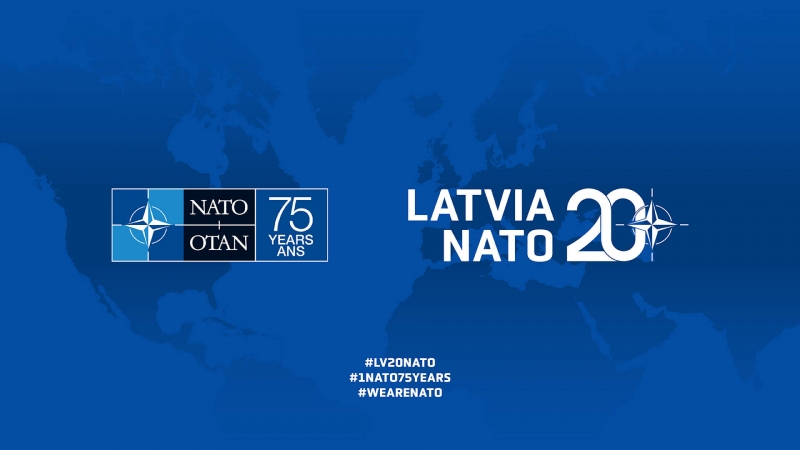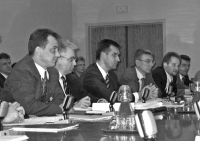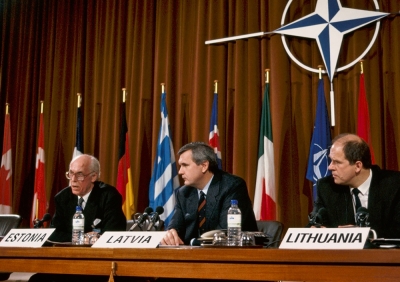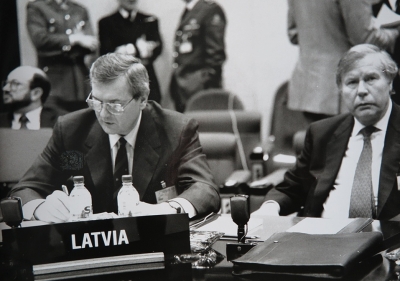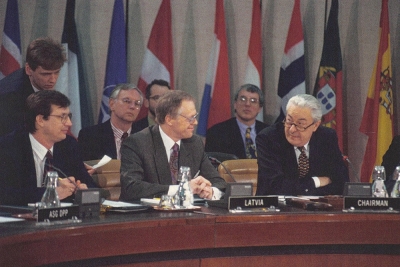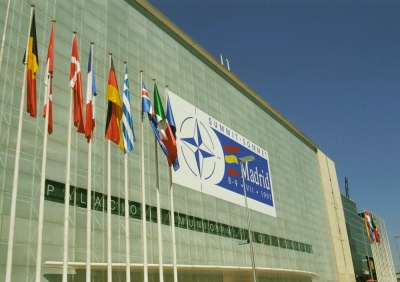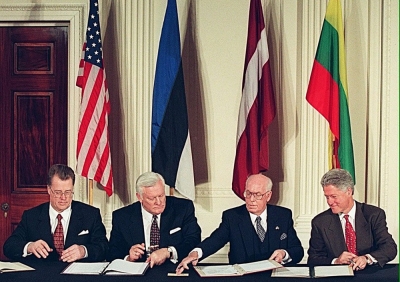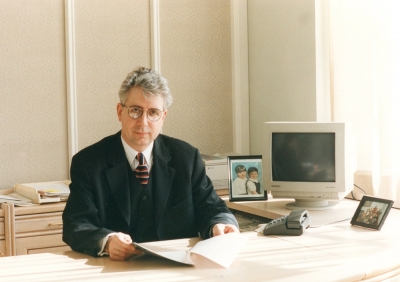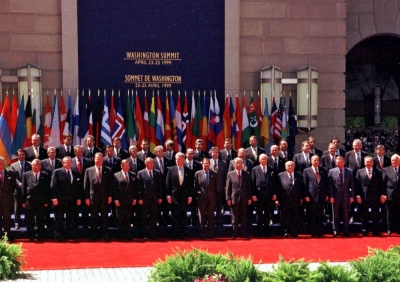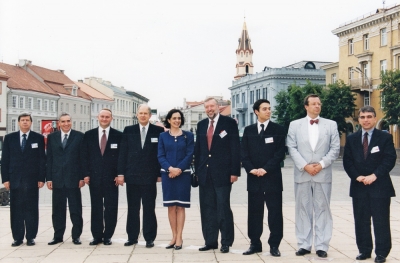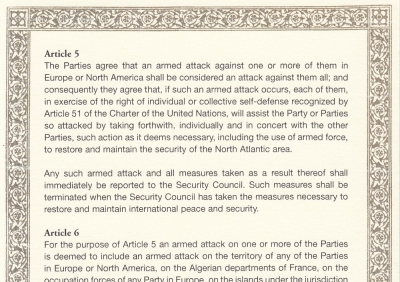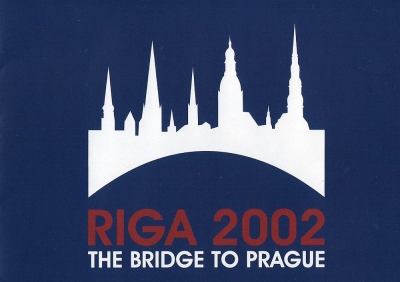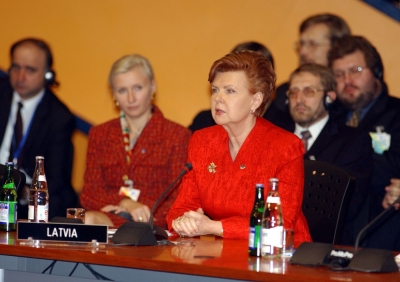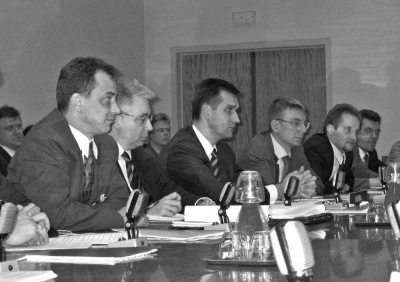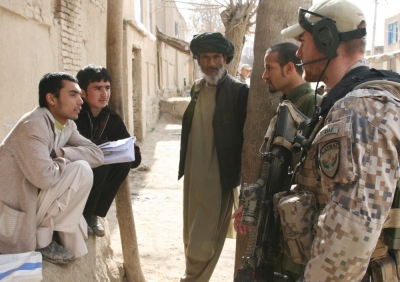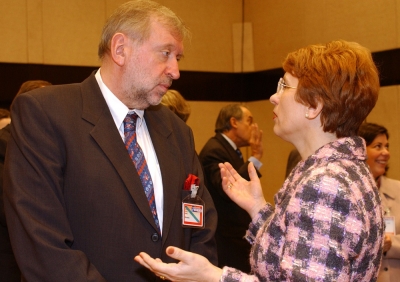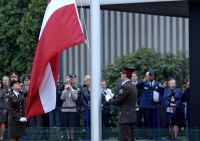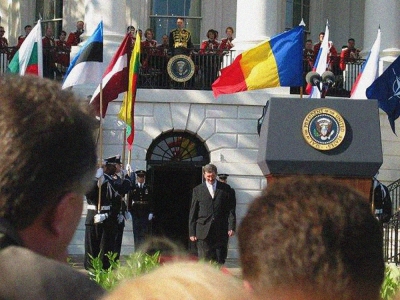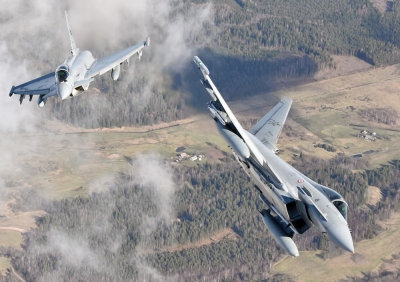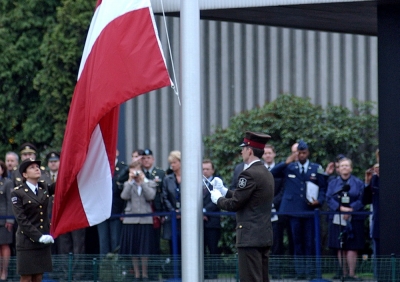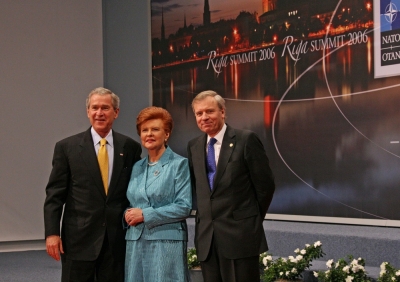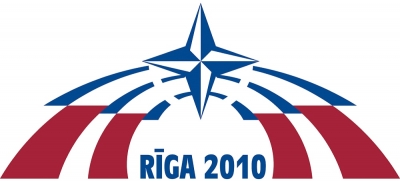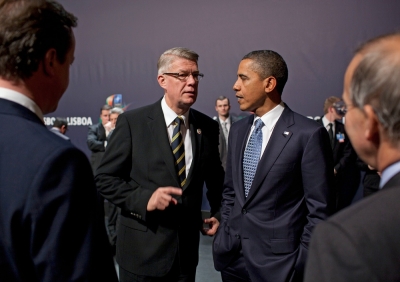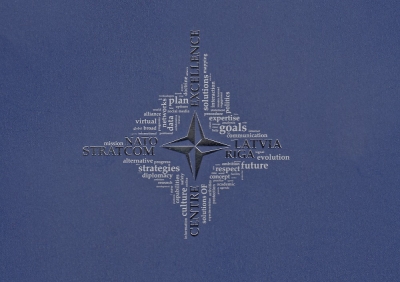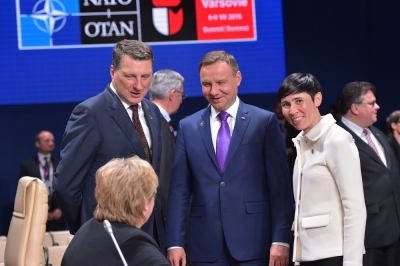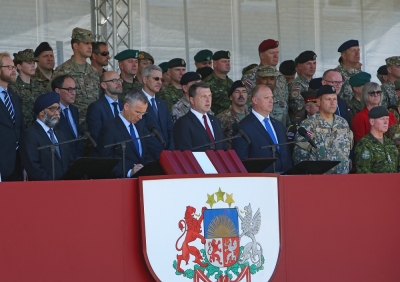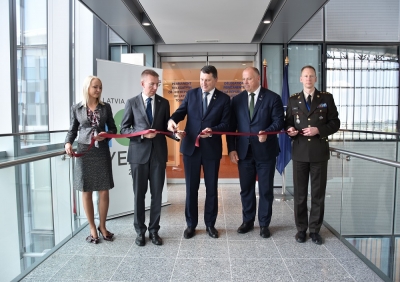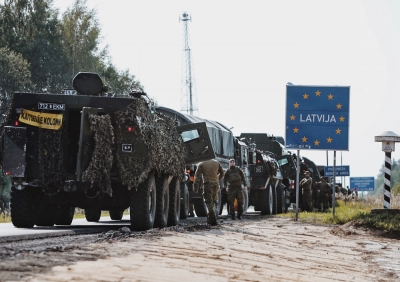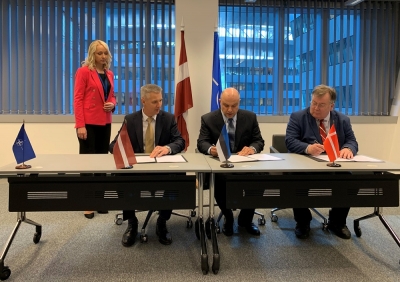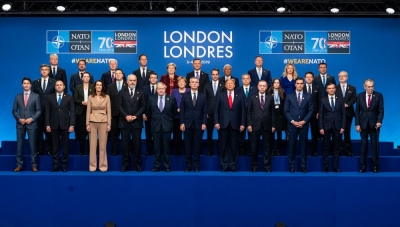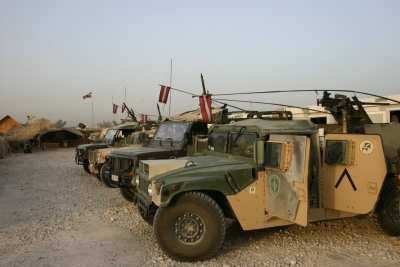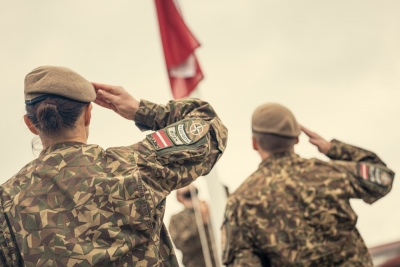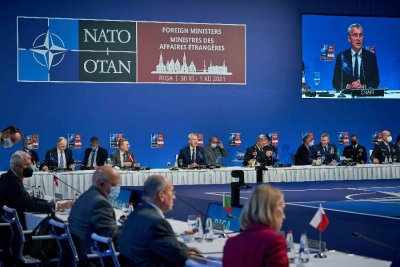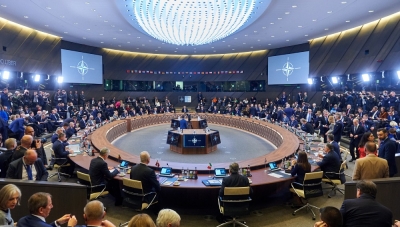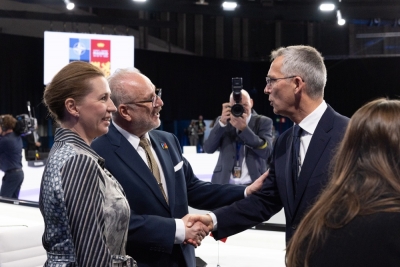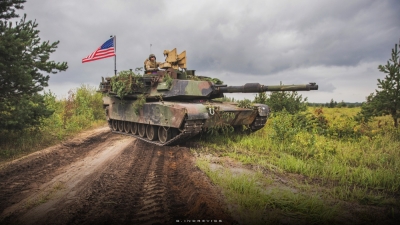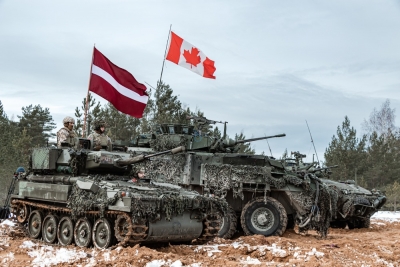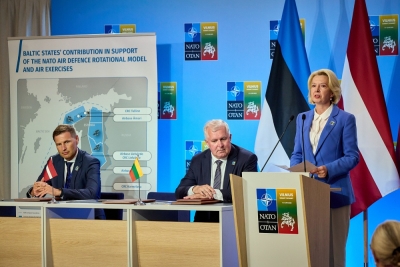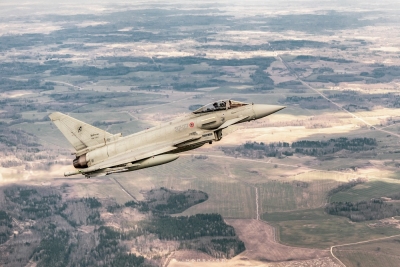On 4 April 2024 the North Atlantic Treaty Organization marked 75 years since its establishment. For the last 20 years Latvia is proud to be a democratic, stable and reliable NATO member states since 29 March 2004.
-
1991
-
20 December
NATO establishes the North Atlantic Cooperation Council (NACC) for cooperation with potential partners. Latvia also takes part in the NACC foundation session in Brussels, thereby becoming a member state of that Council.
-
-
1992
-
11 May
The Minister of Foreign Affairs of the Republic of Latvia, Jānis Jurkāns, visits NATO Headquarters in Brussels.
-
-
1994
-
14 February
Latvia joins the Partnership for Peace programme, which made it possible to receive consultations by NATO civil and military experts, their support and practical assistance in the development of the defence system. The document is signed by Prime Minister Valdis Birkavs in the NATO Headquarters in Brussels.
-
-
1995
-
April
In “The Foreign Policy Concept of the Republic of Latvia”, accession to NATO is named as one of the foreign policy priorities.
-
-
1996
-
January
The Saeima approves a decision to take part in the NATO Peacekeeping Mission in the territory of the former Yugoslavia. -
3 April
Latvia is joining, for the first time, a NATO-led peacekeeping operation, the Implementation Force (IFOR), in Bosnia and Herzegovina, aimed at ensuring the cessation of hostilities. The Latvian unit is part of the Danish-led battalion. -
19 April
Latvia deposits the instrument of ratification of the Status of Forces Agreement and its Additional Protocol.
-
-
1997
-
30 May
The delegation of Latvia headed by the Foreign Minister Valdis Birkavs takes part in the foundation meeting for the Euro-Atlantic Partnership Council (EAPC), the successor to the North Atlantic Cooperation Council, in Sintra, Portugal. -
8–9 July
The NATO Summit in Madrid in 1999 sees the adoption of a landmark decision on NATO enlargement to the East.
-
-
1998
-
16 January
In Washington D. C., the Charter of Partnership among the United States of America and Latvia, Estonia, and Lithuania is signed. -
22 April
The Ambassador Extraordinary and Plenipotentiary of the Republic of Latvia, Imants Viesturs Lieģis, submits his credentials to the Secretary General of NATO. Latvia establishes full diplomatic representation to NATO. -
15 October
At NATO Headquarters in Brussels, the President of Latvia, Guntis Ulmanis, presents Latvia’s NATO Integration Plan.
-
-
1999
-
23–25 April
-
At the NATO summit meeting in Washington, USA, NATO proposes that Latvia and the other eight aspiring countries elaborate a Member Action Plan (MAP) for participation in NATO.
-
Countries aspiring to NATO membership, including Latvia, must prepare their annual national plans that reflect their preparations for the membership of the Alliance.
-
-
-
2000
-
18–19 May
The Foreign Minister Indulis Bērziņš takes part in the meeting of the Foreign Ministers of NATO aspirant countries with NATO Secretary General in Vilnius to discuss further enlargement of the Alliance. The Vilnius Declaration is adopted on the need to further coordinate cooperation among the nine countries aspiring for NATO membership.
-
-
2001
-
11 September
NATO invokes Article 5 for the first time in its history after the 9/11 terrorist attacks against the United States.
-
-
2002
-
5–6 July
Riga hosts the summit meeting of NATO aspirant countries “Riga 2002: Bridge to Prague”. -
21 November
-
The President of Latvia, Vaira Vīķe-Freiberga, takes part in the NATO Summit in Prague, delivering a brilliant speech to the leaders of the Alliance.
-
At the NATO summit meeting in Prague, Bulgaria, Latvia, Lithuania, Romania, Slovakia and Slovenia are invited to begin negotiations on accession to NATO.
-
NATO draws up the Partnership Action Plan against Terrorism in 2002.
-
-
26 November
The State Secretary of the Ministry of Foreign Affairs, Māris Riekstiņš, is appointed head of the delegation to ensure Latvia’s participation in NATO accession negotiations. The State Secretary of the Ministry of Defence, Edgars Rinkēvičs, is appointed negotiator for the “Defence” chapter. The negotiations are held in several rounds.
-
-
2003
-
Latvia joins the largest NATO operation in Afghanistan – the International Security Assistance Force, ISAF.
On 1 January 2015, it is succeeded by NATO’s advisory, training and support mission, Resolute Support, in which Latvia continues participation. -
8 May
The US Senate ratifies unanimously the accession protocols to the North Atlantic Treaty, thereby expressing support for the admission to NATO of seven countries, including Latvia. -
4–5 December
The Foreign Minister Sandra Kalniete takes part in the Meeting of NATO Ministers of Foreign Affairs in Brussels, which is the first time when Latvia is represented in the session of the North Atlantic Council at the foreign ministers’ level together with NATO member states and other countries invited.
-
Latvia's membership in NATO
starting from 2004
-
2004
-
29 March
Latvia, together with other aspirant countries, deposits its accession documents to NATO in Washington and officially joins the Alliance. The Prime Minister Indulis Emsis presents Latvia’s documents to the United States Secretary of State, Colin Powell. -
30 March
NATO launches the Baltic Air Policing mission deployed on Zokniai air force base in Siauliai, Lithuania. -
2 April
The flag of Latvia is raised at NATO Headquarters in Brussels.
-
-
2006
-
28–29 November
The NATO Summit in Riga addresses the unity of the Alliance, the mission in Afghanistan, enlargement matters, and energy security. At the event, NATO Secretary General issues a statement on the NATO Response Force being at full operational capability.
-
-
2010
-
28 May–1 June
Riga hosts the NATO Parliamentary Assembly session. The topics reviewed are the drafting of the NATO’s new Strategic Concept, the Alliance’s relations with Iran and Russia, NATO-led military operation in Afghanistan. -
19–20 November
-
The NATO Summit in Lisbon approves the Alliance’s “Strategic Concept for the Defence and Security of the Members of the North Atlantic Treaty Organization”.
-
In 2009–2010, former Ambassador Extraordinary and Plenipotentiary of Latvia to the US and NATO, Aivis Ronis, works as part of the wise-men group of 12 experts headed by the US Secretary of State, Madeleine Albright, whose recommendations are fed into the NATO Strategic Concept document.
-
-
-
2014
-
The NATO Strategic Communications Centre of Excellence is established in Riga; on 1 September 2014, it is accredited as an international military organisation, its head is the former State Secretary of the Ministry of Defence, Jānis Sārts.
-
4–5 September
In response to the Russian aggression against Ukraine, the NATO summit in Wales approved a Readiness Action Plan providing for the establishment of a Very High Readiness Joint Task Force (VJTF). The Allies agree on the need to move towards spending at least 2% of GDP on defence within a decade.
-
-
2016
-
8–9 July
The NATO Summit in Warsaw has decided to form NATO enhanced Forward Presence (eFP) battle groups in the Baltic States and Poland. Canada assumes the role of the Framework Nation for a multinational battalion-sized battle group in Latvia.
-
-
2017
-
19 June
In an official ceremony, the NATO enhanced Forward Presence battle group is welcomed to the Ādaži military base.
-
-
2018
-
1 June
The Latvian Delegation to NATO moves to the new NATO Headquarters in Brussels. - 11–12 July
The NATO Summit in Brussels. Its decision on the establishment of Headquarters Multinational Division North of NATO in Latvia is of special importance for the country. -
20 August–2 September
Latvia holds “Namejs 2018” military exercise, the largest since the restoration of independence of Latvia.
-
-
2019
-
14 February
At the meeting of NATO Ministers of Defence in Brussels, a Memorandum of Understanding is signed on the establishment of Headquarters Multinational Division North of NATO in Latvia. -
3–4 December
The NATO summit in London marks NATO’s 70th anniversary. NATO leaders agree to continue the Alliance’s adjustment process. The defence plan for the Baltic States and Poland is updated.
-
-
2020
-
November
Latvia joins NATO Mission Iraq, an advisory and capacity-building mission providing support for the strengthening of Iraqi national security institutions and forces, and the civilian sector.
-
-
2021
-
June
After 11 years of interruption, Latvia rejoins KFOR with one light infantry company (up to 160 soldiers). The Latvian contingent contributes to maintaining a safe environment by supporting the development of a stable, democratic, multinational and peaceful Kosovo. -
30 November–1 December
Riga hosts the Meeting of NATO Foreign Ministers, which initiates discussions on the new NATO Strategic Concept. The focus is also placed on the concentration of Russian forces at the borders of Ukraine, and on hybrid operations staged by Belarus to create a migration crisis at NATO’s external border.
-
-
2022
- February–March
-
In response to Russia’s full-scale invasion of Ukraine, the Allies unanimously express their determination to resist the Russian aggression and demonstrate their unwavering support for Ukraine’s independence. NATO defence plans are activated to ensure deterrence of the aggressor and strengthen defence. NATO’s Response Force is sent to the eastern flank countries, and air defence capabilities are enhanced.
-
NATO’s extraordinary summit takes a decision to set up four new NATO battle groups in Bulgaria, Hungary, Romania, and Slovakia.
-
-
29–30 June
The NATO Madrid summit endorses NATO’s Strategic Concept, which defines Russia for the first time as a major threat to Euro-Atlantic security, peace and stability. In Madrid, decisions historic for Latvia are taken on strengthening deterrence and defence on the eastern flank of the Alliance, including by expanding NATO battle groups deployed in the Baltic States to the brigade level. -
December
The US announces a decision to strengthen its military presence in the Baltic States, providing for US soldiers and equipment units to be deployed in Latvia on a heel-to-toe rotational basis.
- February–March
-
2023
-
4 April
In a formal ceremony during the NATO Foreign Ministers Meeting in Brusels, Finland officially joins the Alliance as its 31st member thus strenthening security of the Baltic Sea region. -
10 July
Latvia and Canada sign a joint road map on upgrading the Latvia-based NATO battle group to brigade level by 2026. Canada undertakes to increase by more than twofold the number of soldiers deployed in Latvia and to send heavy military equipment to Latvia. -
11–12 July
The NATO summit in Vilnius approves NATO’s defence plans which strengthen the resolve to protect every inch of Allied territory from the first minute of aggression. NATO Allies commit once again to increasing investment in defence to at least 2% of GDP.
-
-
2024
-
1 March
The Lielvārde Air Base of the National Armed Forces is hosting NATO’s Baltic Air Policing mission for the first time. The German Air Force combat aircraft will be flying patrols for nine months.
-
Photo: Ministry of Foreign Affairs, Ministry of Defense, NATO, private collections of employees of the Ministry of Foreign Affairs




